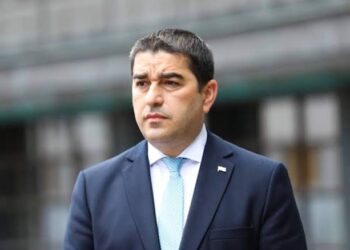Donald Trump’s second term as president has caused excitement all over the world. Georgia is no exception in this regard.
Such a high register of expectations is naturally explained both by the global role of the US and by Trump’s peculiarities as a person. In combination, these two factors can actually – and quite realistically – push one or another stereotypical process in any direction.
Is politics the same as a business deal?
Donald Trump’s political style has been the subject of many judgments and labels. Despite their multiplicity, perhaps the most important unifying feature is the unusual and unpredictable nature of Trump’s handwriting. This is fuelled not only by the campaigning for his first and second term, but also by the very different world in which the 47th President of the United States will have a very powerful word on.
And yes, judging by the statements already made, Trump is promising a ‘situational’ policy based on an assessment of the particular case and circumstances, without a systemic line. This is equally good and bad: it depends for whom, how, and in what case.
Such ‘situationality’ – the term ‘transactionality’ (‘business deal’) is also often used – requires exceptional agility in a rapidly changing environment; the necessary flexibility to adapt and, if possible; proactive action on the Georgian side.
The reader knows for himself, without my dictation, how much we are capable of doing so to date. Therefore, it will be better, hoping for a change for the better, to talk about the political variations of Trump and his team, as well as the adjustment of Georgian ‘realistic’, so-called real, expectations to such variations.
‘Rewriting’ the borders: an updated Monroe Doctrine?
Statements on Greenland and the Panama Canal have made an already ‘messy’ international order even more vulnerable on the face of it.
The risk of vulnerability has been exacerbated by the Russian context of the war in Ukraine and the prospect of equating its political settlement with a ‘business deal,’ as well as China’s claims towards Taiwan. This is the case with regard to the already stated ‘major’ territorial claims, but as for the relatively ‘smaller’ or ‘hidden’ claims, in this case the reader is well aware of the so-called ‘Pandora’s Box’ principle.
What is particularly close and remarkable to us is the inviolability and stability of one of the main principles of the world order – internationally recognized borders. The point is that, for Georgia, as a small/compact country, international legal norms represent an additional protective barrier to ensure its own security and national interests.
Before delving into this issue, I would like to make a few brief clarifications based on the material I have gathered about Trump’s updated understanding of the Monroe Doctrine. In particular, the ‘updated’ version of the Monroe Doctrine is supplemented by a number of principle provisions, namely:
1) Securing the interests of the United States in the immediate vicinity and in the closest possible geographical areas;
2) Avoiding unnecessary conflicts, especially in such remote geographic areas that are either completely unrelated or only superficially related to core United States interests;
3) Restoring faith in the ‘bright future’ of the United States as a ‘strong and great’ country in the eyes of Americans – in line with the so-called ‘America First’ policy.
To summarise all three in one sentence, it is about a realistic and more selective US approach to global problems and crises. And this fundamentally contradicts the country’s previously officially declared principle of ‘global primacy’ of US interests and ‘ensuring security in the world by strengthening democracy.’
In a more practical sense, this means that the role of the United States as a caretaker of the world order may be reconsidered. As a result, American interests will be sorted out according to a strict criterion of their priority for the country. Moreover, it will become disproportionately expensive or even impossible for ‘peripheries’ outside of America’s core interests to request US resources to support their own objectives or needs.
If this approach becomes a tough policy line, countries in problematic geographic regions will face a serious dilemma when and if the interests of a particular country cannot or will not coincide with the fundamental national interests of the United States, when one will not be considered an organic part of the other.
Obviously, this approach poses a serious challenge for Georgia’s foreign and security policy: How do we become a truly necessary partner? How do we reconcile our interests with the stated handwriting of the Trump administration? How can we not be left out of the spotlight of the country that is crucial to the stability and self-sufficiency of the Georgian state?
Speaking of practicality, I deliberately do not go into excessive theoretical detail. There are two reasons for this: firstly, it would be boring to navigate the labyrinth of theory, and I consider it a useless exercise at this stage; second, the extensive discussion of foreign policy and security topics in contemporary discourse in the academic sphere mainly serves for self-affirmation rather than for finding the necessary answers to questions.
Despite these necessary reservations, I feel it important to make a few brief clarifications to talk about, again, the key issue – Georgia’s realistic expectations:
1) The contours of Trump’s stated ‘America First’ policy in international relations are less a matter of statics and more a matter of situational evolution – dynamics. Accordingly, Trump’s presidency does not mean the end of the debate between neo-isolationists on the one hand, and those who believe that the projection of American interests on a global scale needs to be rethought on the other, although this does not automatically mean a diminished global role for the United States;
2) In any case, Trump’s approach heralds a new ‘framework’ for US foreign and defene policy, and, consequently, specific decisions will be made within that ‘framework’;
3) Whatever the theoretical underpinnings of practical politics, two factors have been and will remain the determining factors: power and defense;
4) The proposed line does not imply a claim of ‘perfectionism.’ It is about Trump’s America being a better friend than anyone’s friends, or a worse enemy than anyone’s enemies. It offers only a business alternative, where ‘there is nothing personal.’ Among other considerations, the unacceptability of exporting ‘American exceptionalism’ and imposing it on others it also mentioned;
5) Outside the country, ‘America First’ is defined as support for US partners or allies who are able and willing to look after their own defense capabilities. Appropriate ‘candidates’ must, at a minimum, meet the test of intersection with US geostrategic interests. This is a critical criterion that far exceeds the ‘values’ and ‘ethical norms’ test;
6) One of the distinctive features of the stated policy is conflict resolution rather than conflict management. In a more radical – and very unfavourable – reading, ‘resolving conflicts instead of managing them’ is directed towards a new reality, which, incidentally, does not exclude the rewriting of borders.
7) In discussing the rationality of this approach, reference is also made to the fact that ‘justice’ and ‘peace’ often have opposite directions: while the pursuit of ‘justice’ amounts to going in circles, a practical orientation towards ‘peace’ serves to solve real problems and move forward;
8) According to statements made during Trump’s campaign, such an alliance, interstate association or project (such as BRICS or China’s One Belt, One Road initiative) would be unacceptable to the new administration, which will hinder the effective implementation of the ‘America First’ policy as well as jeopardise the dominance of one of the most important instruments of this policy, the US dollar.
For actualization of the ‘Georgian space’ in Trump’s agenda
Generally speaking, one of the central topics of discussion in US political, academic and analytical circles, is the positioning of the United States in the changing system of international relations. Based on various sources, it seems that the unified security field of our strategic partner is divided into two perimeters – internal and external. Such division is primarily due to a new understanding of US national interests and the proper allocation of resources for them. Instead of the post-Cold War ‘America Everywhere’ approach that required the United States to respond to every conflict or troubled region, that approach is likely to be adjusted today. In particular, the contours of the US selective policy as an alternative to the above-mentioned policy are already being voiced. The essence of this selectivity is manifested in the prioritization of regional tasks or problems. More specifically, more resources will go to countries in the internal security perimeter of essential national interests – geopolitically important geographic regions, and in a systematic way. In contrast, the outer perimeter, i.e., the less important geographic regions associated with US ‘secondary interests,’ would be left to settle for a relatively modest role in terms of US contributions of political, military, or economic resources. This approach determines one of the main foreign policy tasks for Official Tbilisi: the preservation of its place in the internal security perimeter of the US as the leader of the Western order and, consequently, its place in the sphere of essential geopolitical interests.
As for the more specific points about the further adjustment to American foreign policy under the Trump administration, we have already discussed this in more detail in this article: in talking to Washington, the Georgian side should focus on the reciprocity of the issue, coincidence of interests, and rational consideration. American partners should be well aware that support for Georgia is not an act of charity, but is equally in line with both US national interests and the agenda of joint Georgian-American interests.
Op-Ed by Victor Kipiani, Chairman, Geocase














